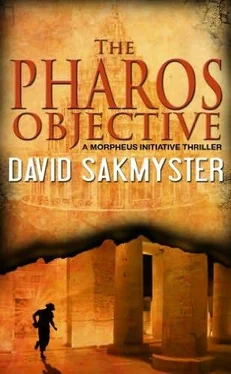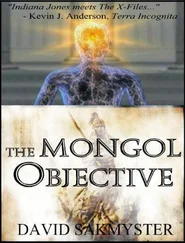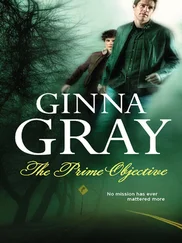David Sakmyster - The Pharos Objective
Здесь есть возможность читать онлайн «David Sakmyster - The Pharos Objective» весь текст электронной книги совершенно бесплатно (целиком полную версию без сокращений). В некоторых случаях можно слушать аудио, скачать через торрент в формате fb2 и присутствует краткое содержание. Жанр: Прочие приключения, на английском языке. Описание произведения, (предисловие) а так же отзывы посетителей доступны на портале библиотеки ЛибКат.
- Название:The Pharos Objective
- Автор:
- Жанр:
- Год:неизвестен
- ISBN:нет данных
- Рейтинг книги:3 / 5. Голосов: 1
-
Избранное:Добавить в избранное
- Отзывы:
-
Ваша оценка:
- 60
- 1
- 2
- 3
- 4
- 5
The Pharos Objective: краткое содержание, описание и аннотация
Предлагаем к чтению аннотацию, описание, краткое содержание или предисловие (зависит от того, что написал сам автор книги «The Pharos Objective»). Если вы не нашли необходимую информацию о книге — напишите в комментариях, мы постараемся отыскать её.
The Pharos Objective — читать онлайн бесплатно полную книгу (весь текст) целиком
Ниже представлен текст книги, разбитый по страницам. Система сохранения места последней прочитанной страницы, позволяет с удобством читать онлайн бесплатно книгу «The Pharos Objective», без необходимости каждый раз заново искать на чём Вы остановились. Поставьте закладку, и сможете в любой момент перейти на страницу, на которой закончили чтение.
Интервал:
Закладка:
But he continued, drawing a welcome smile from Phoebe, who held up his book and made a signing motion. He hurried to wrap up his talk, reading from the last chapter, “… The mob burst into the Serapeum, shattered the meager defenses of the scholars and priestesses inside, then proceeded to tear down statue after statue, demolishing urns, altars and artwork. A trio of young men guarded an arched doorway on the east side.” His voice cracked here as he pictured the scene in his mind. After all, he had witnessed it first-hand…
… as one of the mob. He finds himself urged on with vitriolic hate and burning venom as the Patriarch Theophilus stands behind them, waving his blazing cross and shouting passages from Leviticus. He storms past marble columns, swinging a torch in one hand and a twisted tree branch in the other. He howls as he strikes down one youth, crushes his skull, and falls upon the defenders. The others surge at his back and push him through the door into a large chamber with a rounded ceiling. Across each wall are hollowed-out alcoves overflowing with neatly packed scrolls, trembling like bees in a hive.
With a shout for God and for their Patriarch, twenty of the zealots race across the floor, brandishing torches and crying with delight. The room cowers before their shadows, moving in a twisted parody of an ancient orgiastic dance. Gleefully the men hurl their torches into every corner, igniting anything that will burn.
He barely makes it out, coughing and choking on smoke, trampling on the bodies of men and women, “protectors” of the temple of learning. He takes one last look at a statue of Seshat holding a book to her chest, toppling as four monks run, cheering. Then a burst of flame roars out of the archway, the roof collapses, and a dozen rioters are crushed.
He trips, catches himself, then stumbles over debris and falls at the feet of Theophilus, who holds up a blazing silver cross with both hands and shouts to the heavens, offering up to God their glorious victory.
With stinging eyes, he looks out over Alexandria and witnesses other pyres burning into the huddled night, smoke clouds rising, rising, occluding the stars and blurring the lights of heaven.
Across the harbor, beyond the pall of death and smoke, the lighthouse beacon flickers as if blinking away its tears.
Caleb closed with a brief but chilling postscript on how the early Christians had solidified their hold on the city, vanquishing first by edict and then by violence all record of the early learning. They had forbidden the study of the classics, burning remaining copies of scrolls and assaulting those who still practiced the old beliefs. In many ways, this body of classical work-the robust philosophical ruminations of the past-had shaped and molded and even nurtured Christianity; but now, in the ultimate betrayal, the fledgling religion was stabbing its mentor in the back.
He focused on Hypatia, the familiar classic tragedy of the last great symbol of enlightenment. How this respected scholar-author and teacher had been pulled from her chariot by the incited mob and torn limb from limb, her flesh carved from her bones with stones and shells, then burned and fed to dogs. Only, Caleb added a minor detail he alone knew, having seen it in one of his visions: “… At the end, through a haze of blood and flayed skin, she looked toward the Pharos, and as they beat and clawed and ripped at her body, she seemed to reach for it as a last refuge, or perhaps something more. A necklace was torn from her neck-a chain with a gold charm of the caduceus.”
Maybe it meant nothing, Caleb told myself, or maybe… she had been down there.
He closed the book and took a deep breath. His mouth was dry. He eyed a full glass of water balanced on the edge of the podium. Phoebe stared at him, open-mouthed. Then, the woman at the counter began to clap, and the room erupted into applause.
Caleb spent the next forty minutes signing books and thanking people for braving the nasty weather. He listened to boring stories of the customers’ favorite authors and travels and anything else they wanted to talk about. Finally, the crowd thinned and people made room for Phoebe, who rolled up to his table. She held his book to her chest, hugging it fiercely.
“Oh, Mr. Famous Author,”-her pony tail wagged back and forth as she shook her head-“won’t you sign something clever in my book? Something sweet, and maybe give me your phone number?”
Caleb walked around the table and gave her a crushing hug. In the corner of his eye, the strange but beautiful woman at the counter sipped an espresso and watched him carefully. “I didn’t know you were coming,” Caleb said. “How-?”
“It’s in all the papers back home, big brother. You know how dull the Sodus Gazette can be. They ran out of shore-erosion stories and interviews with the apple farmers, so they had to look elsewhere for news.”
“Great. So Mom knows.”
“Of course. She’s been following your career, while respecting your need for privacy. She and Dad-”
“‘Dad’?”
“Sorry, Mr. Waxman-”
“They got married?”
“Yeah.” She lowered her eyes. “In March.”
Caleb groaned.
Phoebe looked down at her hands. “I know you hate him, but really, he has been good to Mom. He’s supported her, and kept the house going. They’ve published articles together, worked on some other special projects. It was like they were living together anyway, so-”
“So she just gave up on Dad. Went with this loser.”
“Caleb.” Phoebe sighed. “Don’t bring up Dad again. You know he’s gone. You said so yourself.”
He turned his back, walked around the four remaining copies of his book and slumped in the chair. The smell of espresso, jasmine and cinnamon hung in the air, blown about by the door opening briefly.
“Caleb,”-she leaned forward on her elbows-“listen to me. They bought advance copies and found in your book some stuff they think might help with the Pharos.”
“I don’t care,” he whispered.
“You do care,” Phoebe insisted, holding up his book. “You still see it. It’s stuck in your mind, if only in your subconscious. And you’ve seen things the rest of us haven’t. Gone places we never thought to go.”
Caleb shrugged. “It was for a different purpose. The library is what matters to me.”
“Just like the lighthouse mattered for Dad.”
He shook his head. “What could be more important than the search for lost knowledge?” Caleb placed his hand on the cover of his book, feeling the smooth, velvety texture around a picture of a magnificently arched building atop a hill. “The entirety of human knowledge was contained at one point in Alexandria, and… and I’ve seen glimpses of it. That should be-should’ve been our focus. That’s all I care about.”
Phoebe straightened and pulled her shawl tighter around her shoulders. She spoke through pursed lips. “Earth, fire, air, water. The four elements, each represented by a planet-Venus, Saturn, Mars, Jupiter.” She spoke slowly, carefully, watching Caleb’s reaction. “Then, Mercury, the Moon, the Sun. Those are the seven symbols around the caduceus. They’re set in grooves that allow you to turn each symbol.”
“Phoebe-”
“Mom thinks maybe if you spin them in the correct order, the seal will open.”
Caleb laughed out loud. “Really? She thinks it’s that easy? That the grand tower designed to last forever and guarded by ingeniously deadly traps would have only a simple combination lock on the door?” Caleb started to laugh again, but then noticed that woman at the counter looking down her glasses at him. Patiently waiting, it seemed, for him to finish.
Phoebe sighed. “Anyway, we don’t know what the symbols really represent. So there’s no way we’ll get in.”
Читать дальшеИнтервал:
Закладка:
Похожие книги на «The Pharos Objective»
Представляем Вашему вниманию похожие книги на «The Pharos Objective» списком для выбора. Мы отобрали схожую по названию и смыслу литературу в надежде предоставить читателям больше вариантов отыскать новые, интересные, ещё непрочитанные произведения.
Обсуждение, отзывы о книге «The Pharos Objective» и просто собственные мнения читателей. Оставьте ваши комментарии, напишите, что Вы думаете о произведении, его смысле или главных героях. Укажите что конкретно понравилось, а что нет, и почему Вы так считаете.












